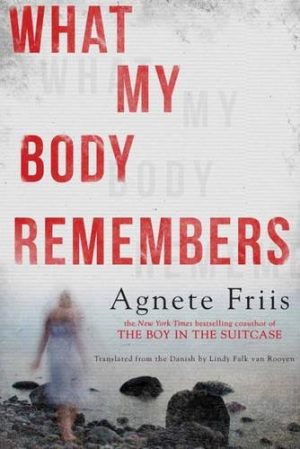 Written by Agnete Friis, translated by Lindy Falk van Rooyen — Ella Nygaard’s earliest memory is becoming an orphan when her father murdered her mother. However, she is suppressing her memory of the event, and as a result suffers from PTSD, and is subject to fits. She is now a single mother on welfare in the suburbs of Copenhagen who must suffer the indignities of a system that monitors and scrutinises her every move. Hovering over her every decision in life is the implied threat of losing her 11-year-old son if she misbehaves. Not helpful to her case is her rebellious distrust of the state and its helping hand. She experienced several foster families before becoming a pregnant young adult, and has scraped through life ever since.
Written by Agnete Friis, translated by Lindy Falk van Rooyen — Ella Nygaard’s earliest memory is becoming an orphan when her father murdered her mother. However, she is suppressing her memory of the event, and as a result suffers from PTSD, and is subject to fits. She is now a single mother on welfare in the suburbs of Copenhagen who must suffer the indignities of a system that monitors and scrutinises her every move. Hovering over her every decision in life is the implied threat of losing her 11-year-old son if she misbehaves. Not helpful to her case is her rebellious distrust of the state and its helping hand. She experienced several foster families before becoming a pregnant young adult, and has scraped through life ever since.
In the bleak opening scene, Ella is smoking outside her cement housing block with her only friend Rosa, herself on the edge of alcoholism. Soon after, she is on the lam with her son Alex after her anger got the best of her, and she holes up in her grandmother’s house on the coast of the North Sea, a house as abandoned as Ella’s memories of her traumatic past.
Ella’s Icelandic grandmother, who owns the place, is the last person she wants to face. She is a tragic figure who has lost one son to the sea and the other she believes was wrongly accused of murder. Ella refuses to discuss it or even see the old woman, who now lives in a care home. As memories begin to surface that remind Ella of the thing she wants to forget, she still won’t visit the old woman and fiercely resists any intimacy, whether offered by a local surfer, the house’s caretaker Baek-Nielson, or even childhood flame Thomas. The one intrusion she allows is the elderly hippie Barbara, an eccentric but kindred spirit who takes her under her wing and eventually moves in with her.
As the title indicates, being in her childhood home re-awakens memories, despite Ella’s resistance. Little by little, the deep-seated trauma of that night on the dunes is awakened, along with more welcome fugitive memories, such as how to clean a fish and where best to find amber on the beach. The memory of her mother’s murder also drives a second narrative that alternates with Ella’s own, this one leading up to that fateful night in 1994.
As Ella struggles with her current situation, flashbacks from the perspectives of each of Ella’s parents, Anna and Helgi, bring us closer to the moment of murder with each chapter. Helgi is a construction worker in a stagnant marriage, whose torrid affair with a mysterious young woman named Christy becomes increasingly unstable, and he realises he can’t extricate himself. His wife Anna must deal with her husband’s rejection, but also increasingly disturbing threats from the conservative religious community that expelled her years before. Part of the growing suspense built by Agnete Friis is how these facts might relate to the murder
As events threaten to overcome her, Ella realises she must re-kindle her memory order to protect herself and her son from the very secrets that the past reveal. She seeks out her old case files in order to reconstruct the events that turned her life upside down, to understand her parents’ and her own struggles. She is aided by a trusted social services counselor over the years, who is distinct from the other counsellors – the ones that passively harass her in scenes vividly portraying life as a ward of the state.
The dilapidated cottage by the rugged sea, which both shelters Ella and also compels her to face her demons from childhood, serves as a powerful symbol for Ella’s struggling mind and her remembering body. The gradual unraveling of the central murder, which provides suspense and culminates in a final confrontation, plays out within a cohesive theme of memory and redemption.
If you like deeply flawed and reluctant protagonists who overcome adversity, there are certainly echoes of Nina Borg here. And that’s no surprise, because alongside Lene Kaaberbol, Agnete Friis is co-author the Nina Borg series. In her solo debut she delivers a realistic, gritty thriller with a lot of heart. You will find yourself rooting for the angry, damaged underdog Ella who yearns to have a normal life with her son. This novel is hopeful and uplifting and while delivered in the sober tones characteristic of Nordic noir, you may still feel a hitch in your throat at it’s cathartic ending.
What My Body Remembers is out 4 May. For more excellent Danish crime fiction read a book by Jussi Adler-Olsen.
Soho Crime
Print/Kindle/iBook
£8.61
CFL Rating: 5 Stars









